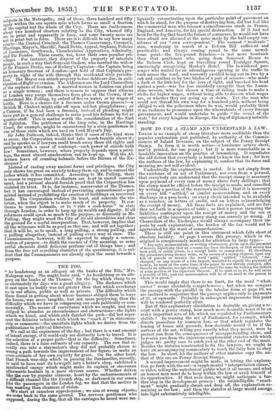THE FOG.
" As headstrong as an allegory on the banks of the Nile," Mrs. Malaprop says. She might have said, "As headstrong as an alle- gory on the banks of the Thames," for the fog which clung to us so obstinately for days was a great allegory. The darkness which it east upon us bodily was not greater than that which overhangs us in our affairs, public as well as private. The difficulty which those found in getting about whose business obliged them to leave the house, was more tangible, but not more perplexing, than the difficulty which we have in compassing our ends politically or com- mercially. The means of conveyance which we sought, and were obliged to abandon as encumbrances and obstructions—the lights which we hired, and which only dazzled the path—did but repre- sent the delusive vehicles with which we "coach it" in statesman- ship or commerce—the uncertain lights which we derive from the publications in political literature. We rail at the supineness of the day • but there is a vast amount of latent energy, if it could only see distinctly how to travel. It is the selection of a proper path—that is the difficulty. Sometimes, indeed, there is a false estimate of our capacity. The cow that re- cently ran into a staymaker's shop did not probably choose so wrong a path towards the improvement of her figure, as make an over-estimate of her own capacity for grace. On the other hand, that French war-ship which in passing the Dardanelles, recently, is said to have sent its bowsprit into a baker's shop, exhibited a misdirected energy which might make its captain or steersman afterwards hesitate in a more obvious course. Whether driven likeithe,cow by popular clamour, beset by the embarrassments of a it channel like the French ship, or darkened in our senses like the -passengers in the London fog, we find that the motive is less wasting than clearness of vision. We start at causeless apprehension ; we aim at wrong objects; we come back to the same ground. The nervous gentleman who supposed, during the toga that all the carriages he heard were ma- lignantly concentrating upon the particular point of pavement on which he stood, for the purpose of destroying him, did but feel like the commercial man who foresaw a simultaneous crash in France, England, and America, for his special destruction. If it had not been for the fog that beset the future of commerce, he would not have been afraid nor alarmed at the noise made by the half-empty om- nibuses of our " own correspondent." The earnest " moderate " man, wandering in search of a Reform Bill sufficient and practicable, and always coming round to the same unwel- come point—the five-pound franchise—is not more heartsick than that gentleman who, going from Somerset House to the Reform Club, kept on travelling round Trafalgar Square, unceasingly recognizing Morley's Hotel. The bewildered pas- senger who waited for an advantageous opening in the traffic to rush across the road, and narrowly avoided being cut in two by a cab and omnibus as by two blades of a pair of scissors—who made a dash at the link-boy for the love of light, and knocked his head against a post—was far less suicidally energetic than the Lanca- shire weaver, who has chosen a time of falling trade to make a strike for higher wages, without being able to discern what wages are, or whether they are going up or down. Yet the man who could not thread his own way for a hundred yards without being obliged to ask the policeman where he was, would probably think it no rashness to pronounce upon the whereabouts of every foreign government, and would undertake to guide " the vessel of the state " for every kingdom in Europe, the fog of diplomacy notwith- standing.


























 Previous page
Previous page